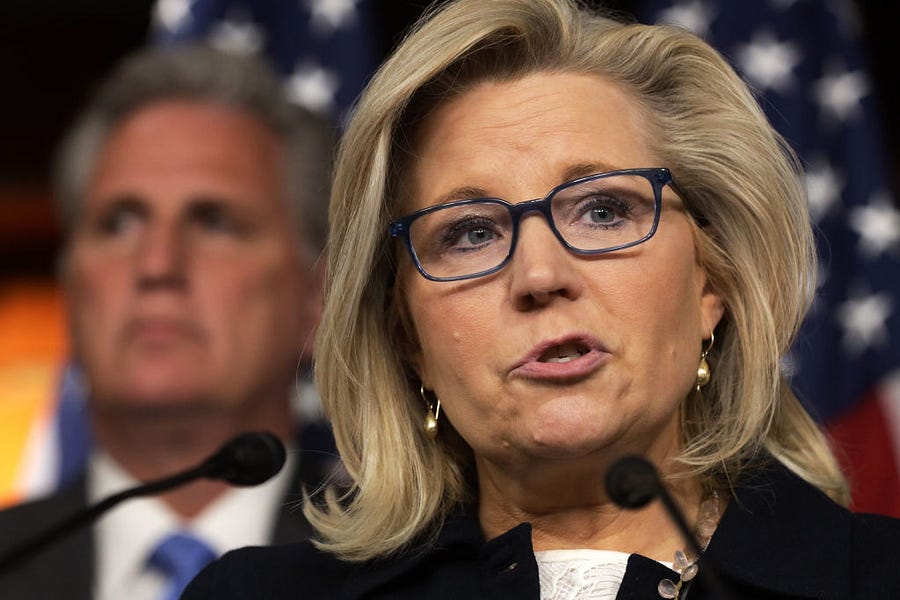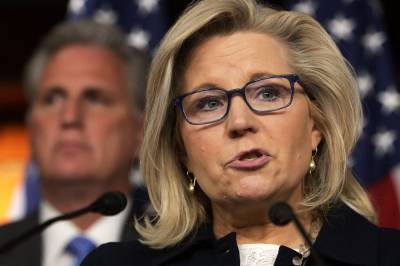Speaking before a crowd of roughly 50 to 60 Republican lawmakers and activists in the Capitol Hill Club on January 19, 2022, House Minority Leader Kevin McCarthy issued a rare defense of GOP Rep. Liz Cheney. According to two House Republicans who attended the lunch, McCarthy explained why he pushed back against House Freedom Caucus Chairman Scott Perry’s latest effort to boot her from the conference for her decision to sit on the select committee investigating January 6.
It was a politically pragmatic defense—not made on Cheney’s behalf but rather with his conference’s minority status in mind. Stripping her of her former title as House GOP conference chair—an effort he’d vocally supported in May of last year—was one thing. But kicking her out of the conference entirely, McCarthy argued, was inadvisable in that it would cut down the number of Republican committee seats in the lower chamber.
That Capitol Hill Club luncheon marked a strange moment in McCarthy’s fraught relationship with Cheney, his former leadership colleague whose reelection bid he has spent the past few months actively campaigning against. But McCarthy’s months-long vendetta against Cheney—a politically driven mission aimed at ensuring his rise to speakership should Republicans retake the lower chamber—is nearing its final blow.
Now roughly a year and a half after being censured by her own state’s GOP for her vote to impeach former President Donald Trump, Cheney will face her own voters in today’s Republican primary for the state’s at-large congressional seat. And the polls aren’t looking favorable for the three-term incumbent: In most surveys, she trails challenger Harriet Hageman by more than 20 points.
McCarthy is already relishing her widely anticipated loss at the Four Seasons in Jackson, Wyoming, where he’s helping fundraise for the National Republican Congressional Committee and the Congressional Leadership Fund. He’s spent the past few days from that perch making his case for Hageman, a 2020 election-denying candidate whom Trump has endorsed.
“This is unusual, but it’s an unusual situation, too. But Harriet is an amazing candidate,” McCarthy said in a Monday interview with Fox News of his support for Hageman—quite the turnaround for a minority leader who only two years ago praised Cheney as a “a powerful voice for conservatives.”
First elected to Wyoming’s sole congressional seat in 2016, Cheney has gone from serving as House GOP conference chair to a rank-and-file member now censured by the Republican National Committee and reviled by many of her House Republican colleagues.
On the top of that list of Cheney foes is McCarthy, who has for months urged Republican members to campaign against her reelection after she agreed to serve as vice chair on the House select committee investigating January 6. So pronounced is McCarthy’s disdain for Cheney that he rallied more than 100 House Republicans to co-sponsor a fundraiser for her Trump-backed opponent in March.
The two started to diverge in January 2021, when McCarthy reneged on his private pledge to House GOP leaders that he would tell Trump to resign for his behavior on January 6. Cheney was the only member of House GOP leadership who voted to certify the Electoral College results.
“I think this will pass, and it would be my recommendation you should resign,” McCarthy vowed to tell Trump in a private House GOP leadership call on January 10, 2021, Jonathan Martin and Alex Burns reported in the New York Times earlier this year. “What he did is unacceptable. Nobody can defend that and nobody should defend it,” McCarthy said in the private leadership call, three days before he said on the House floor that Trump “bears responsibility” for the attack.
But McCarthy quickly reversed course, visiting the former president at his Palm Beach home, Mar-a-Lago, days later. Cheney, who did not know about the McCarthy trip in advance, described the move as “really stunning” in a May 2021 interview with NBC’s Savannah Guthrie. That interview came the same month McCarthy assured reporters: “I don’t think anybody is questioning the legitimacy of the presidential election.” But a few months later McCarthy endorsed Hageman, who now insists that the 2020 election was “rigged.”
While McCarthy has boosted an election-denier, Cheney, meanwhile, has focused on the Capitol riot investigation and ensuring that Trump never steps foot in the Oval Office again. In her place as the House GOP’s new conference chair is Elise Stefanik, a close McCarthy ally who voted to decertify the 2020 election results and who recently expressed support for a resolution to “expunge” Trump’s second impeachment.
Not all Republicans revile Cheney’s stands. Heath Mayo founded Principles First, an organization aimed at purging the Republican Party of Trumpism. This year’s second annual Principles First Summit featured Cheney as its keynote speaker.
“[Cheney’s] had lines that she wouldn’t cross even if saying them put the party in a difficult spot,” Mayo said, contrasting her with McCarthy, whom he described as being weak in his convictions. “You might not even characterize McCarthy as a leader, he’s more of a follower because he’s sort of listening to folks and then changing what he says, based on the politics of the moment.”
But even Cheney’s biggest cheerleaders acknowledge that the anti-Trump movement is a lonely one. Of the 10 House Republicans who voted to impeach Trump in the aftermath of the Capitol riot, four have retired and three others have lost their Republican primaries to Trump-endorsed challengers. Only Dan Newhouse of Washington and David Valadao of California look poised to keep their seats next year, though Valadao’s general election campaign is already shaping up to be a tough one.
That leaves Cheney as the final pro-impeachment House Republican to face her primary voters this midterm cycle. As primary day dawned, her supporters hoped crossover support from Democrats might blunt the damage. (Cheney’s website includes instructions for Wyoming voters on how to change their voter registration so they can vote in the Republican primary.)
Per a Washington Post review of Wyoming voter registration records, Cheney seems to have pulled some Democrats into her corner ahead of today’s contest. “On Jan. 1, Republicans had more than 196,000 registered voters, while Democrats had about 46,000. By Aug. 1, Republicans gained 11,000 new voters, Democrats lost 6,000 and those voters unaffiliated with either party dropped by 2,000.”
That voter registration shift is still unlikely to make much of a dent in Hageman’s lead. “Principled leaders throughout history have always sort of just said: ‘You know what? Now’s not my time … When push came to shove and I was asked what to do I sort of pulled the lever in this direction that I thought was right—and damn the consequences,’” said Mayo, who hopes Cheney will run for president in 2024.
Many rank-and-file House Republicans, meanwhile, are already looking forward to a Republican conference without Cheney in it. GOP Rep. Brian Mast of Florida described Cheney’s congressional career as “marred by arrogance” in an interview last week in the U.S. Capitol. “I could care less what her next step is.”
Correction: This story originally wrote that GOP Rep. Dan Newhouse represents Oregon. He represents Washington.







Please note that we at The Dispatch hold ourselves, our work, and our commenters to a higher standard than other places on the internet. We welcome comments that foster genuine debate or discussion—including comments critical of us or our work—but responses that include ad hominem attacks on fellow Dispatch members or are intended to stoke fear and anger may be moderated.
With your membership, you only have the ability to comment on The Morning Dispatch articles. Consider upgrading to join the conversation everywhere.